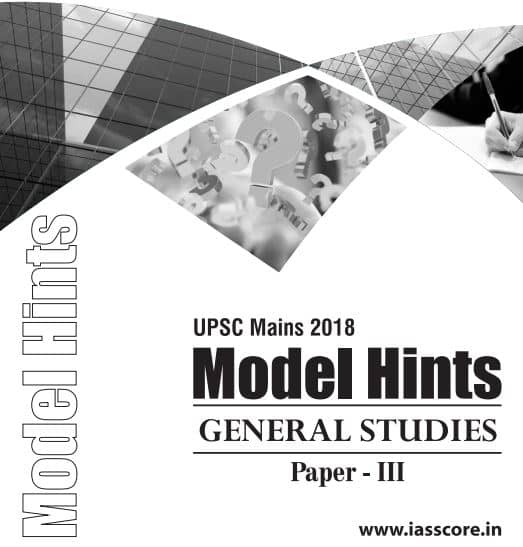‘UPSC IAS Mains Solved Question Paper’ PDF Quick download link is given at the bottom of this article. You can see the PDF demo, size of the PDF, page numbers, and direct download Free PDF of ‘UPSC IAS Mains Solved Question Paper’ using the download button.
UPSC IAS Mains Solved Question Paper PDF Free Download

Mains Solved Question Example
Q.1 “Access to affordable, reliable, sustainable and modern energy is the sine qua non to achieve Sustainable Development Goals (SDGs)”. Comment on the progress made in India in this regard.
Hints:
Energy is the golden thread that connects economic growth, social equity, and environmental sustainability.
It generates a consistent stream of power to meet basic human needs, maintain and improve social functioning,
and advance living standards. Validating the same, SDG-7 commits affordable and clean energy for all.
Achieving the goal To expand energy access, it is crucial to enhance energy efficiency and to invest in renewable energy. India is projected to be a significant contributor to global energy demand, contributing around one-quarter of the total.
Thus, the energy produced should be as sustainably as possible—that is to say, the power generated by energy use should be much greater than the resulting waste and pollution.
India has a vast renewable energy potential through wind, solar, biomass, and small hydro which is concentrated
in certain parts of the country. But to tap on these endowments, India’s renewable energy sector requires
significant financing.
Steps were taken by India:
• India intends to achieve 40% cumulative electric power installed capacity from non-fossil fuel-based energy resources by 2030, as one of the ways to curb global temperature increase.
• Indian Government has also focussed its attention on the rural clean energy sector by supporting distributed
generation in the form of community-based, self-sufficient biomass and solar power.
• National Solar Mission also has an ambitious goal of providing 2 crore solar lighting systems in place of kerosene lamps to rural communities.
• Installations of solar power systems, particularly on rooftops, all over the country. The target of 40 GW rooftop solar by 2022 will result in the abatement of about 6 crore tonnes of carbon dioxide per year.
Access to affordable, reliable, sustainable, and modern energy is integral to global development in the twenty first century. But, there are challenges that require a pragmatic, multi-faceted approach.
Solutions need to be developed at both local and global scale, where Governments and agencies must work together.
Thus, a robust national framework for implementation and funding support for states would be critical to achieving the desired targets.
A dedicated nodal agency at the center to coordinate effectively with the state-level agencies could help.
| Author | iasscore |
| Language | English |
| No. of Pages | 22-50 |
| PDF Size | 3-5 MB |
| Category | Education |
Year 2020 UPSC IAS Mains Paper Solution
| Question Paper | Solution Coming Soon |
| General Studies 1 | GS 1 Solution |
| General Studies 2 | GS 2 Solution |
| General Studies 3 | GS 3 Solution |
| General Studies 4 | GS 4 Solution |
| Essay | Essay Solution |
Year 2019 UPSC IAS Mains Paper Solution
| Question Paper | Solution Coming soon |
| General Studies 1 | GS 1 Solution |
| General Studies 2 | GS 2 Solution |
| General Studies 3 | GS 3 Solution |
| General Studies 4 | GS 4 Solution |
| Essay | Essay Solution |
Year 2018 UPSC IAS Mains Paper Solution
| Question Paper | Solution |
| General Studies 1 | GS 1 Solution |
| General Studies 2 | GS 2 Solution |
| General Studies 3 | GS 3 Solution |
| General Studies 4 | GS 4 Solution |
| Essay | Essay Solution Not Available |
Year 2017 UPSC IAS Mains Paper Solution
| Question Paper | Solution |
| General Studies 1 | GS 1 Solution |
| General Studies 2 | GS 2 Solution |
| General Studies 3 | GS 3 Solution |
| General Studies 4 | GS 4 Solution |
| Essay | Essay Solution |
Year 2016 UPSC IAS Mains Paper Solution
| Question Paper | Solution |
| General Studies 1 | GS 1 Solution |
| General Studies 2 | GS 2 Solution NA |
| General Studies 3 | GS 3 Solution |
| General Studies 4 | GS 4 Solution |
| Essay | Essay Solution |
Year 2015 UPSC IAS Mains Paper Solution
| Question Paper | Solution |
| General Studies 1 | GS 1 Solution |
| General Studies 2 | GS 2 Solution |
| General Studies 3 | GS 3 Solution |
| General Studies 4 | GS 4 Solution |
| Essay | Essay Solution |
Year 2018 UPSC IAS Mains Paper Solution
| Question Paper | Solution |
| General Studies 1 | GS 1 Solution |
| General Studies 1 | GS 2 Solution |
| General Studies 1 | GS 3 Solution |
| General Studies 1 | GS 4 Solution |
| Essay | Essay Solution |
Year 2018 UPSC IAS Mains Paper Solution
| Question Paper | Solution |
| General Studies 1 | GS 1 Solution |
| General Studies 1 | GS 2 Solution |
| General Studies 1 | GS 3 Solution |
| General Studies 1 | GS 4 Solution |
| Essay | Essay Solution |
Year 2018 UPSC IAS Mains Paper Solution
| Question Paper | Solution |
| General Studies 1 | GS 1 Solution |
| General Studies 1 | GS 2 Solution |
| General Studies 1 | GS 3 Solution |
| General Studies 1 | GS 4 Solution |
| Essay | Essay Solution |
Related PDFs
UPSC Prelims Question Paper With Answer Key PDF
UPSC IAS Mains Solved Question Paper PDF Free Download
